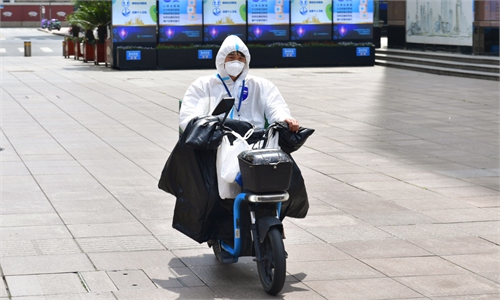Auto firms in Guangzhou hit by production disruption as Shanghai shockwaves spread

Photo taken on Oct. 16, 2018 shows the automobile production line of Guangzhou Automobile Group Co., Ltd in Guangzhou, south China's Guangdong Province. Photo:Xinhua
Auto supply chain snags in Shanghai and its surrounding region are now triggering shockwaves that are spreading to vehicle production bases in other areas of the country, with major auto firms in Guangzhou seeing production suspension and drastically slumping shipments due to a shortage of auto parts and blocked logistics.
The spillover effect has already led to a shipment decline of around 30 percent for Guangzhou's major auto firms, such as Guangzhou Automobile Group Co (GAC Group) and its GAC Honda and GAC Toyota units, an industry insider told the Global Times on Saturday.
GAC Honda, GAC Toyota, and Dongfeng Nissan have either halted or suspended production. Some industry players in the city also told the Global Times that the strict epidemic restriction measures in Shanghai and the nearby Yangzte River Delta, where their main suppliers are located, have brought serious challenges for their production and operation.
Cui Dongshu, secretary-general of the China Passenger Car Association, also told the Global Times on Saturday that the anti-pandemic restrictions had severely affected auto shipments for Guangzhou auto firms.
Cui estimated that shipments had slumped by around 20 to 30 percent in the city, which is one of China's main manufacturing bases and export hubs.
Guangzhou is currently the city with the largest vehicle production capacity in China, and the suspension of production by certain firms may have a further impact on the national auto industry, observers said.
In 2021, the annual production of automobiles in Guangzhou hit nearly 3 million units, ranking first in the country for the third consecutive year. And the retail sales of new energy vehicles increased by 1.3 times year-on-year, reaching twice the amount sold in 2019.
Cui said that although firms in Shanghai are gradually resuming production, the resumption speed has been "far slower than expected" and more time will be needed for things to get back to normal. "Only when the Shanghai virus is under control can we expect a full recovery of the whole industry chain."
Across the country, auto sales have weakened in the past few weeks. Retail sales of passenger vehicles for April are expected to be 1.1 million units, down 31.9 percent year-on-year, the China Passenger Car Association (CPCA) said on Friday.
The association said residents' income and consumer confidence in coronavirus-hit areas have been hit, further restricting the recovery of the auto market.
In the new energy market, some leading manufacturers have also been affected by production and supply problems, and their sales have declined in the short term, but most manufacturers in the sector have maintained good sales performance. It is expected that the new energy market will maintain a market penetration rate of more than 25 percent this month, the CPCA said.
The repeated outbreaks of the epidemic will have some impact on various original equipment manufacturers. If the situation continues, it will have a big impact on the overall industry in the long run, China's largest electric vehicle maker BYD told the Global Times on Saturday.
The Shenzhen-based firm said a shortage of auto parts has resulted in production suspension for many firms, but it said BYD's strategic planning had given the company "a better risk-response ability."

